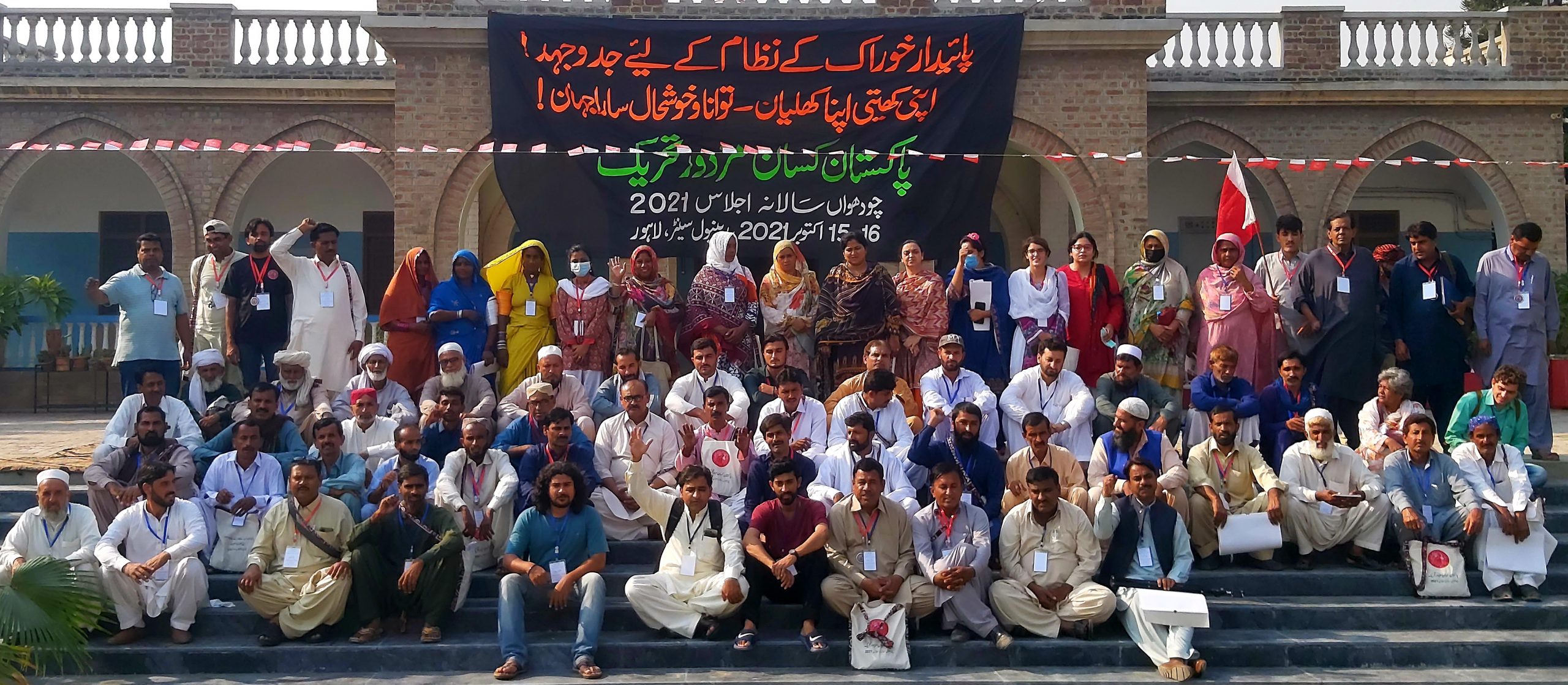Press Release | PKMT 14th Annual Conference 2021 | October 15-16, 2021
Pakistan Kissan Mazdoor Tehreek held its 14th Annual Conference from October 15 -16 at Renewal Centre, Lahore and simultaneously, held panel discussions and demonstrations to mark International Rural Women’s Day and World Hunger Day. During the events, speakers held corporate entities, IFIs and neoliberal policies accountable for creating food systems that are directly responsible for the hunger, malnourishment and economic destitution of more than a billion.
Azra Sayeed, Roots for Equity exposed corporate hijack of the United Nations Food Systems Summit, highlighting the role of the World Economic Forum, and foundations especially, the Gates Foundation and philanthropies who have provided corporate-driven policies depriving farmers of land, livelihood and food by funding technology intense systems in third world countries; the entire UNFSS was termed as nothing but a hallmark of false solutions to hunger e.g. pre-mixed therapeutic food that accrues billions of dollars in profit for corporations. Wali Haider, PKMT General Secretary highlighted the neoliberal policies in food and agriculture introduced in Pakistan amidst the pandemic reflecting much of the neocolonial policies emitting from the UNFSS. These policies are a fresh wave of attacks on small and landless farmers in Pakistan, embedded in the Pakistan Agricultural Transformation Plan, Kisan Card scheme, CPEC’s agricultural policies and livestock development programs. Policy features of digitalization of the agricultural economy, value chain strengthening and cluster-based food production panders to the corporate lobby, facilitates corporate land grab for export-oriented production, benefits landlords and industrialists and captures natural resources e.g. water, agricultural land, forests and rare minerals for company use. Essentially, it is a blueprint of UNFSS’s vision for food systems transformation and completely overrides small farmers’ rights to land and livelihood.
According to Raja Mujeeb, Steering Committee member, PKMT, the Global People’s Summit, a Global-South counter to the UNFSS main objective was to mobilize landless farmers, agricultural workers, indigenous peoples, fisherfolk and rural women across the world to develop a People’s Action Plan and draw up a Declaration for a people-led radical transformation of the current food regimes towards just, equitable, healthy, and sustainable food systems. The GPS is a testimony of the people’s collective resistance against the global corporate food empire and a call for genuine food systems transformation.
As part of the panel on movements and struggles, Asif Khan, PKMT Steering Committee member, presented an overview and analysis of peoples’ struggles and movements across the world, saying that revolutionary politics and direct action is the only way to grant farmers complete rights overall productive resources and complete autonomy and decision making in food and agriculture.
A number of other activities highlighted Rural Women’s Day with a tribute to rural women for the formal and informal, paid and unpaid work in food and agriculture. PKMT also celebrated 10 years of its struggle for seed sovereignty by holding a seed mela with indigenous seeds from all over Pakistan.
In addition, a protest was held as part of the Global Day of Action against IMF and World Bank Annual Meetings. The protest actions called for an immediate TRIPS waiver, debt cancellation and an end to resource plunder and greenwashing practices in the name of development.
Demands:
- Implementation of agroecological approaches to agriculture based on food sovereignty principles that center peasants’ right to land and collective rights over all critical productive resources, in order to create just, equitable, healthy and sustainable food systems that ensure safe and nutritious food for all;
- Recognition of the role that women and rural communities play in conserving plant and animal genetic resources through agricultural practices rooted in traditional knowledge;
- Boycott all neoliberal corporate-led platforms, policies and action plans such as UNFSS and bilateral and multilateral trade agreements such as the RCEP, CPTPP and others that allow the monopolization of global trade by TNCs;
- Provide climate justice now by demanding greater accountability and higher compensation for solutions from countries with a higher level of development who have destroyed Earth’s life systems due to extractive and polluting capitalist production model.
Release by: Pakistan Kissan Mazdoor Tehreek (PKMT)
